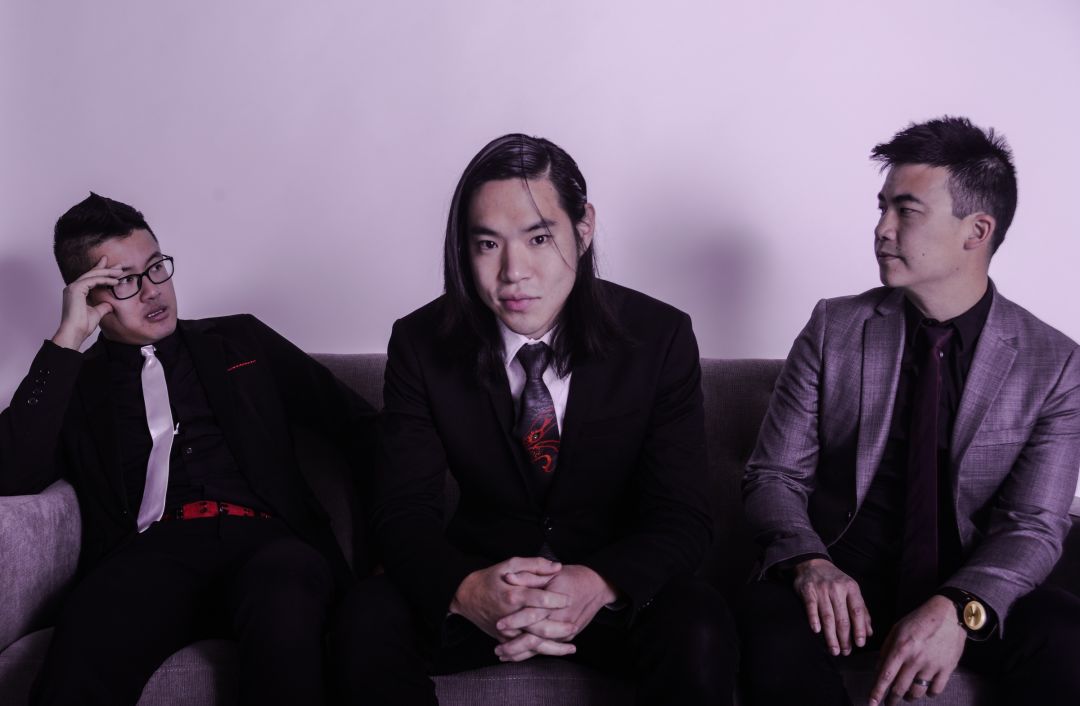Portland's 'Chinatown Dance Rock' Band Takes Its Final Bow

Joe X. Jiang, Ken Shima, and Simon Tam.
Image: Jady Bates
Aron Moxley’s raw, untamed vocals met whoops and cheers as he swung across the stage of the Doug Fir last Monday night in a fur coat, leopard shirt, and brown leather boots. He was singing “Love Within My Sins,” one of the first songs by his “Chinatown dance-rock” band the Slants. After more than 12 years together, it was their final show.
“I don’t get butterflies,” says Moxley, who left the band five years ago but returned for Monday’s victory lap. “It was great to run it back one last time, to be part of something so unique, special, and explosive.”
The Portland group self-identifies as the world’s only all-Asian American dance rock band and is widely known for a public seven-year struggle to trademark its name. When members of the Slants submitted an application to the US Patent and Trademark Office, the office rejected it, citing the Lanham Act, which bans names that may “disparage … any person, institution, belief, or national symbol.” The band appealed the decision, and it wound up climbing all the way to the Supreme Court, where a 2017 ruling came down unanimously in their favor.
However, at the final show on Monday night, the focus was on the people and the music, as founding members Moxley, Tyler Chen, and Jonathan Fontanilla joined the stage with current lead singer Ken Shima, guitarist Joe X. Jiang, and longtime bassist/front man Simon Tam.
It’s a focus that the Slants lament as forgotten, as the attention surrounding their legal struggles has steadily drowned out the band’s catchy keyboard hooks and ’80s synth pop beats.
“I remember the first time I went to DC with Simon for an interview with NPR,” begins Jiang. “At the end we mentioned the music and the next EP that was coming out—”
“—and they just edited it right out,” Tam recalls.
Tam conceived the idea of an all-Asian band after watching Kill Bill, which was the first time he witnessed Asians being depicted as cool in American media. “Despite having over 17 million Asian Americans in the US, our communities had almost no representation in the Billboard charts, major music magazines, or rock clubs,” he writes on his website.
Shima remembers the recruitment. “I was online one day and saw an audition notice that said, ‘Wanted: Asian lead singer,’ and I looked in the mirror and said, ‘I’m Asian, I can sing.’”
The Slants drew their musical inspiration from the bands of Tam’s childhood (Depeche Mode, New Order), but for many in the Slants Army (the nickname for the band’s fans), it’s the lyrics that resonate.
“From the Heart,” the Slants’ open letter to the Trademark Office, sports the lines: “Sorry if we try too hard / To take some power back for ours / The language of oppression / Will lose to education / Until the words can't hurt us again.” It eventually made its way onto Barack Obama’s #ActToChange album as part of the White House Initiative on Asian American and Pacific Islanders’ campaign to reduce bullying.
“Their lyrics actually have meaning, you know,” says longtime fan Meagan Kiloh, who still has the armbands from her cosplay outfit that the band signed at the anime convention Sakuracon back in 2009.
Christina Townes, now 29, first heard the Slants at Anime Oasis in Boise when she was 17. Growing up half-black and half-Filipino in Idaho, she felt like an outsider in a mostly white state, but she didn’t feel wholly accepted in black or Filipino groups either. “It was like, ‘You’re not Asian enough to be in the hip-hop dance crew,’” she remembers.
But then she saw the Slants, whose members were mostly Asian and or mixed, and heard the lyrics to their song Sakura: “We sing for the Japanese and the Chinese and all the dirty knees.” It’s a reclamation of the nursery rhyme Moxley was taunted with as a child: “Chinese, Japanese, dirty knees, look at these.”
“I can kind of relate to that,” says Townes. “It’s horrible mockery, but in the song it’s just like, ‘You want to make fun of me? Well, guess what? You can’t, because I’m proud of it. I’m different, but that’s OK.’ Their songs helped me find myself and where I fit in in this world.”
Although Townes and Kiloh bought the band’s albums (Kiloh listened to the Slants on her phone while she was delivering her daughter, who is now, of course, a budding Slants fan), for them, the real magic came from the live shows, where Moxley crashed cymbals with his bare, bloodied knuckles and breathed literal fire.
Although Tam never set out to be an activist, in 2009, he began volunteering with Portland’s Asian Pacific American Network of Oregon (APANO) after receiving messages of support from Asian American youth and emerging artists. Tam helped register voters, booked the Slants at APANO’s annual Jade International Night Market, and eventually became a board member, sticking around as the organization ballooned from one staffer to 12.
His status as an advocate grew from there. When 19-year-old Army private Danny Chen committed suicide in 2011 after being bombarded with racial slurs and physical abuse by both his cohort and superiors, Armed Forces Entertainment invited the Slants to play at U.S. and NATO military bases in Bosnia and Kosovo. The band slept in the bunkers and ate in the mess halls with the soldiers, who even snuck them into some “weird European clubs.”
When Asian American inmates at the Oregon State Prison were being harassed (also in 2011), the Asian Club invited the Slants to perform. They spent the entire day in the prison, playing music and chatting with the inmates. At the end of the day, a former white supremacist approached Tam and asked for an autograph. He wanted to give it to his daughter so she’d know about the band; he didn’t want her to make the same mistakes that he had.
“That’s the stuff you’ll never forget,” Tam says.
Tam moved to Nashville in 2017. In January, Shima had his first child. Those fairly massive life events, coupled with the 2017 resolution of their Supreme Court case, slowly led to a decline in the band’s musical ambitions. They announced their final performance on July 10 of this year, though they say they may still record together sometime down the road.
“I feel like this is just like adding or subtracting a band member or evolving our sound,” Tam says of the decision to disband for now. “To me, this is just another step in that evolution, and it's a chance to grow the philanthropic side, the entrepreneurship side.”
The current members will continue to volunteer at the Slants Foundation, which they started in 2018 to provide mentorship and scholarships to emerging Asian American artists from playwrights to dancers.
Tucked in Tam’s new home is a music room with an entire chalkboard wall devoted to current projects and future ideas. In April, he published a memoir about the Supreme Court case called Slanted: How an Asian American Troublemaker Took On the Supreme Court.
“I can actually check off like half a wall. That’s the amazing part,” says Jiang of the last time he visited Tam’s practice room. “I have friends who have checklists. Nothing gets checked off. But literally as I was looking at his walls I was like, ‘Oh, there’s that book, and there’s that project that’s already being set up.”
As for the other Slants, Chen has dreams of opening a bed-and-breakfast with his wife, Moxley bartends at Fire on the Mountain, and Fontanilla is busy raising his family. They sometimes miss the music, but for the most part they seem to have moved on.
For the most part.
“I can’t give this up—it’s addicting” says Jiang. “I’ve cried a couple times on stage, and it was just like ‘Holy …’ I want that feeling again. That’s what I’m chasing. I don’t know what’s next, but if I find a chance to play again, even if it’s just for a month, I’m quitting my day job.”
Sitting outside the Doug Fir Lounge in the last hours before their final show, they don’t talk much about the trademark. They joke about Shima being the only band member who went through a probation period after a rough audition. He looks a little hurt, but then smiles as he tells everyone about his 10-month-old baby seeing bubbles for the first time.
Over Korean BBQ the next day, Fontanilla recounts the time Moxley, always hot-blooded and unrestrained, punched through a window and chucked a laptop onto I-84; he remembers the awe of playing for the troops in Bosnia on New Year’s Eve, and he still feels the disappointment of the trademark battle overshadowing his musical endeavors.
“It doesn’t feel over, though,” Tam and Shima agree before the show.
During these conversations, I kept wondering how the Slants would be remembered. Yes, they’re the Trademark Band (sorry, guys). And yes, they’re Chinatown dance rock. But after the lights fade from the walls of the Doug Fir Lounge, they’re the band that hangs back to say hi. They’re the band that signs Kiloh’s armbands again, 10 years later.
They’re the band that sticks around.




